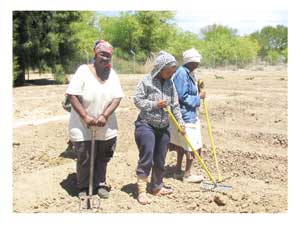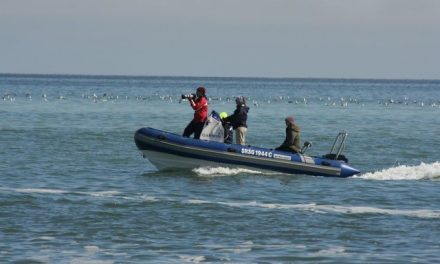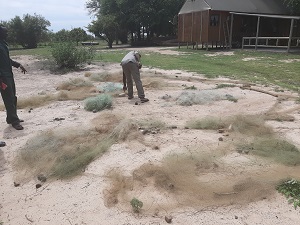
Communities neglect empowerment projects

The !Haib Conservancy received a large piece of land to start a community project. But only the elderly seem to be interested in the garden. (Photograph by Clemencia Jacobs – Ministry of Information & Communication Technology)
But in most cases, these projects only flourish in their first year after which they are often neglected. In some parts of the Karas region, garden projects lie idle and in most cases, the communities themselves are destroying the projects.
“When we started out two years ago, the whole community was involved and the garden was very beautiful. We grew carrots, beetroot, butternuts, dates, cabbage and lucerne. The project fed about 60 households. But now, whenever people see something grow in the garden, they break the lock on the gate and pull everything from the ground. What hurts me is that they do not eat the produce, instead they destroy it,” a clearly irate Moses Swartbooi, caretaker of the Ada Huisen Garden Project at the Gabes settlement says.
The garden used to feed AIDS orphans, the elderly and those who do not have a means of income.
Swartbooi, who is 72 years old, has been tending the garden by himself for the past year.
“People say that I am bossy and that I am taking the project over but when I ask them to assist, they do not want to. They just neglected it. I wake up at six every morning and walk to this garden which is quite far from my house and I water the plants and make sure everything is fine. I am an old man and would like the assistance of the youth but nobody wants to get involved,” he explained.
About 30 kilometres away from Gabes, is Hobas where the !Haib Conservancy is located. A garden project was started in the conservancy in 2009 to feed 20 households. The project’s first harvest was in 2011.
The problem at this project is not neglect, but the fact that only the elderly are working on it.
“Young people really do not have the time for this. It is a good project but we need more people to run it. What’s worse is that only pensioners are working at the project; they do the ploughing and planting. Only three of us are under 60 years old.
“The most significant challenge here is the fact that we have little water. This will definitely become a problem in the future. We also have a problem with insects who feed on the plants, we do not have money to buy pesticides,” said Johannes Swartbooi, chairman of the !Haib Khaibasen Garden project.
Swartbooi says the conservancy will apply for more land to plant dates in the future.
Communities are supported and empowered through programmes such as the Community Based Natural Resource Management (CBNRM) programme, Namibia Protected Landscape Conservation Areas Project (Nam-Place) and various other conservation initiatives.
Speaking at the hand-over of three developmental projects at Klein Karas which is situated 200km south of Keetmanshoop recently, Netumbo Nandi-Ndaitwah, Minister of environment and tourism, urged the community to complement the efforts being made by the Government and its partners, and to take charge of the projects.
Nandi-Ndaitwah added that she wants local businesses to support the community’s garden project. She said lodges must commit to buying garden produce from this project, thus keeping the revenue within the region.
“These arrangements are vital in the success of the projects as they ensure sustainability. The transport strike in South Africa must be a lesson to Namibian business people to support local production,” she argued.
The projects include a solar-powered sewing project, support to the community garden and the Tourist Information Centre which is run by the community.











































